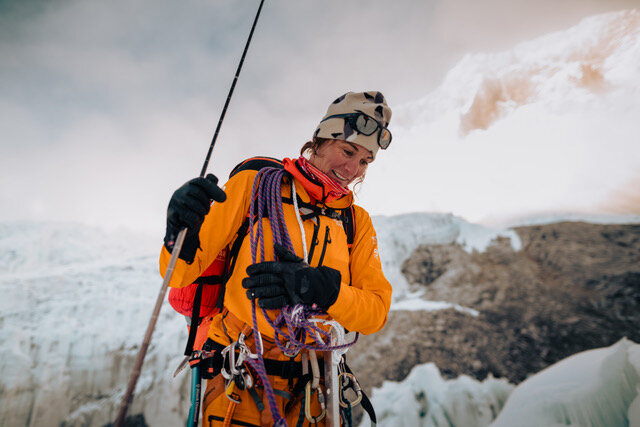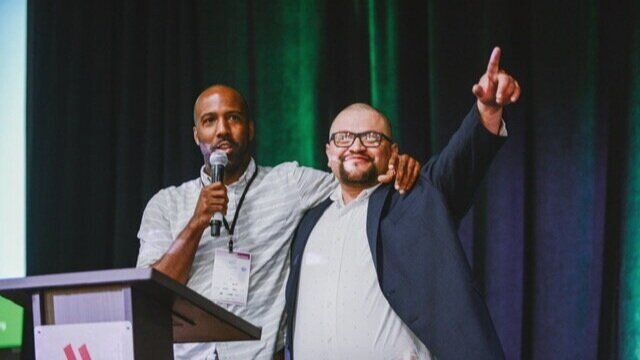NATURE SILO-BREAKER JUAN MARTINEZ: Perspectives from the Youth and Community Outreach Fellow at The Aspen Institute’s Center for Native American Youth
/Juan Martinez on the Grand Teton during his 2009 climb of the iconic Wyoming peak. Photo: Conrad Anker
As a young teenager, Juan Martinez felt certain that his social and economic circumstances were pushing him and his peers into a cycle of frustration—if not rage—against a system apparently stacked against people like him. But then he discovered one place, one power on Earth, that treated him just the same as anyone else: Nature.
Inspired by the wilderness, and meeting like-minded mentors, Juan has made it his mission to show communities across America how they too can harness Nature, and one another, to heal, collaborate, and build a more perfect world.
--David Braun
David Braun: How did you become an activist for nature? What does that mean?
Juan Martinez: I have worked at the intersection of people, community well-being, and the healing power of nature, since 2000, the year I had a revolutionary awakening as to how nature impacted my own healing from trauma.
To me, an activist is an individual who understands three things: That we carry the responsibility to inspire others to seek out the best version of the world for future generations; to acknowledge the history and legacy of ideas and places that make today possible; and to translate the impossible into reality by conspiring with innovation and luck.
“Nature gives me a place where prejudice does not exist.”
DB: What was your trauma and how did nature give you a revolutionary awakening? How did this motivate you to become an activist?
JM: Nature gives me a place where prejudice does not exist. A place where I can show up without worrying if the trees will ask for my immigration status, where the river will not ask how much money I have in my pocket, and where the sun does not judge me for the path I have walked. The sun wakes and greets me with a sunrise, regardless of who or what I am. That is counter to what I experienced growing up where, because of my immigration status and being poor, systems of inequity limited my opportunities. At the age of 15 I believed that my future would be to drop out of school, make money fast, and live a life where I had to always watch my back.
DB: Instead your path has taken you to some very interesting places, both in terms of geography and institutions. What have been some of the highlights, and how have those experiences influenced you?
JM: One of the highlights has been visiting Arctic Village in Alaska, as a guest of the Gwich’in community. This was a part of Fresh Tracks’ cross-cultural connection where young leaders from Compton, California and Alaska hosted each other in their communities. Fresh Tracks is a program of The Aspen Institute Forum for Community Solutions, supported in partnership by Native Americans in Philanthropy, Children & Nature Network, and Center for Native American Youth.
What impacted me the most about this experience is the reinforcing of a vision I have always held, that at the end of the day, we all seek out a caring community--a place to call home with people to care for.
Juan Martinez with his wife, Vanessa Torres—a National Park Service director—during their 2013 wedding in the Grand Teton National Park, where they first met. Their story was recounted in the short film, Love in the Tetons. Photo: Rebecca Martin
The other highlight of this journey was the opportunity to work with the National Park Service as we celebrated 100 years of our National Parks in 2016. It was through a training session I was asked to speak at that I met my wife, Vanessa Torres. She is a constant source of inspiration as she builds pathways of equity within the National Park Service.
DB: Where do you find yourself today? And where do you imagine your life’s journey might take you next?
JM: Today I lead the Fresh Tracks program at The Aspen Institute Forum for Community Solutions. Our mission is to expand opportunities for rural, indigenous, and urban youth through civic engagement, cross-cultural exchange, and the outdoors.
Fresh Tracks supports over 200 community leaders ages 18 to 25 across the country, working to address systems of inequity through civic engagement, cultural sharing and understanding, and the healing power of the outdoors. We facilitate collaboration among these communities to effectively address their most pressing challenges.
At Fresh Tracks we believe that outdoor spaces enhance community connections by fostering the time and space for deeper thought, reflection, and ultimately, human and cultural connections.
Martinez with the Opportunity Youth Forum in Aspen, CO 2019. Photo: CJ Goulding
DB: What's an example of your impact/success, and what has been your biggest challenge?
JM: Devin Edwards is from Boston and Trenton Casillas-Bakeberg is of the Cheyenne River Sioux Tribe and lives in Rapid City, South Dakota. To Devin, Keystone was just another pipeline being built out there somewhere, but because of the connection and relationship he built with Trenton, he now understands that Trenton’s fight for justice, at Standing Rock, looks a lot like the search for justice in his very own Boston. (Read an article in the Dorchester Journal, Jan 2, 2020 about Devin Edwards: A legislative aide talks of his odyssey to a State House desk.)
“It is the young leaders and connections that happen because of my work that hold me accountable and keep me motivated.”
There are many quantifiable ways to measure my success over the last 10 years, but ultimately it is the young leaders and connections that happen because of my work that hold me accountable and keep me motivated. Conserving wild and open spaces for the sake of the privileged to enjoy them does not compare with the opportunity to engage someone in those spaces so that they can find their own voice and power to improve our world.
DB: Is there someone else who shares your epiphany that nature empowers people to build a better life?
JM: CJ Goulding started as a participant of a program I started at the Children & Nature Network, The Natural Leaders Network. We have grown our relationship from participant, mentor and mentee, to now peers and colleagues. Supporting and sharing in CJ’s growth and his story inspires me and holds me accountable to the fact that we need to foster new and innovative leaders. His blog post, Why I Wear Jordans in the Outdoors, is a must-read for anyone who wants to understand bridge-building between nature and people.
CJ Goulding and Juan Martinez, celebrating the tenth anniversary of the Natural Leaders Network at The Children & Nature Network’s 2019 International Conference. Photo: Children & Nature Network
DB: So there's a new generation emerging, I sense, that is more aware of nature and the need to embrace it. Perhaps Greta Thunberg may be just the cutting edge of this. Do you agree that young people are more aware of what's happening to the natural world, and perhaps more motivated to become engaged as activists? Or are they perhaps increasingly disillusioned, despairing, and disconnected from nature, making them more isolated, indifferent or even unaware of what's happening to our planet and its critical lifelines?
“I think there is a moment arising… this generation’s rally cry is a powerful one.”
JM: I think there is a moment arising. Many of us have the ability and privilege to connect and learn about pretty much everything within the palm of our hand. Yes, we are more aware and I think the rising generation of leaders is more aware of their surroundings and issues than ever before, and at a younger age.
This moment calls for brave and innovative solutions that look at breaking silos across issues and lay the pathway towards solutions that we have never seen before. This generation’s rally cry is a powerful one. We now need to place the resources and decision-making power in their hands.
DB: Where would you like to take your work in the next few years?
JM: My work has grown to be a platform for movement leaders to come together, look at each other eye to eye, and understand that the issues we care about are personal and critical in unique ways. The goal we all share is to improve the lives of those who are closest to the pain and to equip those leaders with the right opportunities and resources to build community and youth-driven solutions.
Martinez on a visit with wife, Vanessa, to Glacier National Park, Montana. Photo: Vanessa Torres
DB: You were so inspired by climbing Grand Teton with Conrad Anker. Why was that, and how did it change you? Are there other mountains for you to climb, more places to explore?
“I learned from Conrad Anker and his family: live in gratitude and joy, and every single day.”
JM: My favorite part about climbing The Grand Teton with Conrad Anker is the joy in reflecting back to those days and seeing two people from different places and different journeys share the achievement and adventure as we reached the summit. I am forever grateful to Conrad and his wife Jenny--they have opened their home and hearts to me and my family. If there is anything that I learned from Conrad and his family, it is to live in gratitude and joy, and every single day.
DB: How do you imagine and hope you will evolve as an explorer? Where or what is left that you would truly like to explore?
JM: Exploration to me means a consistent rhythm of imagination and wonder. I’m learning ways to keep pushing myself and much of that comes from connecting with my fellow explorers. Every time I share time and space with any of them, I walk away reassured that we are all doing what we can to build a better now and tomorrow.
INTERESTED IN BOOKING JUAN MARTINEZ TO PRESENT AT YOUR EVENT? PLEASE CONTACT US.
Connect with Juan D. Martinez on Twitter and Instagram.
IDavid Braun is a veteran journalist and former VP of Digital Media at National Geographic. Connect with David on Linkedin.















